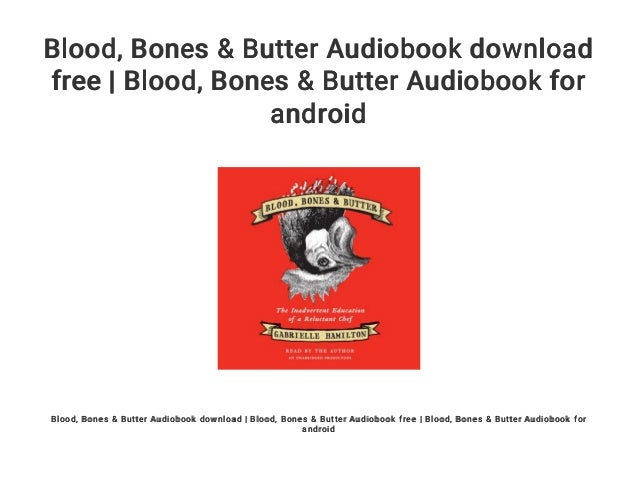

In France, Hamilton falls in love with the rawness of it all, the "geese laid out with their long necks arranged in great question mark arcs around their totally plucked bodies," "the local heavily salted butter," the "knotty, wormy, quite small apples from which the cider is made." "I was sucking something in," she tells us. There's the gnarly, punk-rock aesthetic, the in-your-face food style that dominates young cooks today the way they glory in offal, sardines, pork fat and other ungenteel elements. This is what you'd read if you came here from another country (or from another decade) and wanted to know what people valued in dining. End of story! That's the dream of more cooks than I can count, both of the home and restaurant kind, and it has seldom been told more honestly or powerfully.Īnd then there's the fact that Blood, Bones & Butter, more than any book I know, captures the essence of contemporary cool when it comes to food. She had some s_ty waitress and catering jobs and then opened a small bistro that was totally true to who she was. (See Josh Ozersky on which cookbooks are worth adding to your kitchen shelf.)Īnother explanation for the Hamilton hoopla is that the sheer ordinariness of her life lets her connect with readers in a way that Achatz or Bourdain can't. (This isn't her fault Hamilton hasn't led as interesting a life as Bourdain, whose résumé both as chef and reprobate is far more colorful.) Grant Achatz, whose own memoir is being released in early March, at about the same time as Hamilton's, but with far less hype, must be punching walls: the most brilliant chef of his generation writes, albeit with no special literary talents, about almost having to have his tongue cut out because of cancer and all the foodies can talk about is Hamilton's girlhood lamb roasts! It communicates the inner life of cooks as well as any memoir except Bourdain's Kitchen Confidential, which is, at least in my opinion, in a class by itself. Blood, Bones & Butter tells the story of a Pennsylvania tomboy, her quirky upbringing and precocious eating habits, her skeevy adventures doing blow and skimming money as a waitress in her 20s, and her subsequent coming of age as a chef. EVER.") Having read the book, I have a couple of guesses.įor starters, Hamilton is a great writer. So why is chef Gabrielle Hamilton's memoir, Blood, Bones & Butter so hotly anticipated? (Mario Batali says "Gabrielle Hamilton has raised the bar for all books about eating and cooking." Anthony Bourdain goes even further, calling it "Simply the best memoir by a chef ever. Prune has been around for 10 years and everybody likes it, but it's by no means a hot restaurant. It has never received a Michelin star, nor has its chef ever received a James Beard Award. It has around 30 seats, a bohemian air and a menu of urbane comfort foods, artfully prepared. Follow a small restaurant in New York City called Prune.


 0 kommentar(er)
0 kommentar(er)
